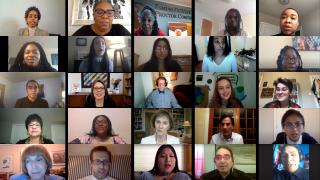Why Uu Presence United Nations
By Bruce Knotts
This post was originally sent out on December 28 via a monthly email message from Director Bruce Knotts of the Unitarian Universalist Association Office at the United Nations. Subscribe to the UU@UN email list.

Screenshots of presenters at UU@UN virtual events that took place in 2020
Why are Unitarian Universalists at the United Nations?
At a recent meeting of the NGO Security Council Working Group, the Irish Permanent Representative to the UN, Ambassador Geraldine Byrne Nason, repeated what many UN staff and diplomats have said: “Prompting from NGOs is critical. Please, please, please engage with us. Please hold us to account.”
The Unitarian Universalist Association Office at the United Nations (UU@UN) is one of these NGOs (non-governmental organizations). The UU@UN and our fellow NGOs bring issues into focus and demand action when critical human rights, humanitarian, and justice issues are not receiving the attention they deserve.
The UU@UN’s role is to be part of the conversation at the United Nations in spaces where global decisions are made.
When important issues are forgotten or downplayed, the UU@UN’s voice is there in coalition with others to change the trajectory of the meeting.
We’ve done effective work this year in highlighting racism, misogyny, and islamophobia. An important service we can perform toward ending oppression is to shine a light on it so that all can see its terrible reality.
The UU@UN team is now preparing events for the coming year on the destructive nature of the fast fashion industry, the role religion has played in fostering slavery and racism, and the right to joy for transwomen of color.
I am particularly excited about the 2021 virtual Intergenerational Spring Seminar in April that will address the theme All In for Climate Justice: Food Equity and Sustainability. (Registration is open until March 18; please consider attending this online event.)
The UU@UN has built important relationships and strengthened civil society coalitions that make change happen.
UN agencies and member-state missions are open to meeting with the UU@UN and our NGO partners. Those that sympathize with the goals of our UUA Office—like the missions of Ireland, Norway, South Africa, Sweden, Jordan, Fiji, Mexico, and other member states—are eager to partner with us.
Member states such as Russia, China, India, the United States, and others will meet with us, but will push back on issues that put them in a bad light.
Nevertheless, we get our voice heard and we make headway even in the face of resistance. The UU@UN and its allies in the NGO community serve as a check on powerful nations like the U.S. that otherwise act with impunity at the UN.
A recent news article about the current Secretary-General António Guterres pointed to U.S. government interference in the United Nations. The article notes of Secretary-General Guterres:
[The Secretary-General] has eschewed controversial issues, notably in the field of human rights. He is particularly careful to avoid stepping on the toes of the five veto nations on the Security Council — Britain, China, France, Russia and the United States. After all, they determine whether he can get a second term or not and also contribute heavily to the UN’s annual budget. Hence, he sidesteps speaking out about the treatment of the Uighurs in China or repression in Russia or even the Jamal Khashoggi murder by Saudi Arabia.
It is clear that the big powers call the shots at the United Nations, but NGO action can and has moved the trajectory of the UN in the direction of its values. Our community is active in keeping attention focused on critical human rights issues that, for political reasons, the Secretary-General and others decline to address.
This is hard work. It is not easy, and it is not work we can do alone. Having your support behind us makes a world of difference.
We succeed by working with strong coalitions of NGOs and member states who are bold enough to hold firm against the powerful nations.
The work is done through many conversations that slowly but surely move policy in the directions of justice, human rights, and sustainable ways of living.
I am grateful to have you as a partner in this effort. Thank you for your support and commitment through this challenging time.
The UUA Office at the United Nations is supported by the generosity of individuals like you. Donate now.